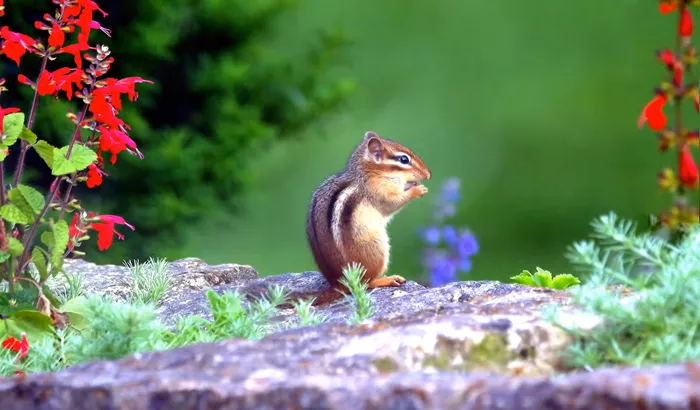Chipmunks are adorable little creatures, but when they start invading your garden, they can quickly become a nuisance. They dig holes, steal seeds, and sometimes even damage plants. If you’re looking for a natural, chemical-free way to keep chipmunks away, using plants is an effective solution. Certain plants have strong scents or textures that chipmunks dislike, which can act as a natural deterrent. In this guide, we’ll explore how to use these plants to keep chipmunks out of your garden, while adding beauty and functionality to your landscape.
Understanding Chipmunk Behavior
Before diving into the plants, it’s important to understand why chipmunks behave the way they do. These small mammals are primarily herbivores and are always on the lookout for food sources like seeds, fruits, and even the roots of your plants. Chipmunks are also very curious and tend to dig holes, which can disrupt your garden and cause damage. By using plants that they find unpleasant, you can create a natural barrier that will help keep them away.
Plants That Repel Chipmunks
There are several types of plants that are known to repel chipmunks due to their strong scents, spiky textures, or pungent tastes. Let’s look at some of the most effective ones.
1.Lavender
Lavender is a popular herb with a lovely scent that many humans enjoy, but it is often too strong for chipmunks. The strong, fragrant oils in lavender plants act as a natural repellent. Plant lavender in areas where chipmunks are known to frequent. Not only will it keep them away, but it will also add a beautiful touch to your garden with its purple flowers.
2.Mint
Mint, like lavender, has a strong scent that chipmunks dislike. It grows rapidly and can form dense patches that act as a natural barrier. Mint is also a versatile plant, which can be grown in containers to keep it contained or directly in your garden. The strong aroma of mint is an excellent chipmunk deterrent and can help freshen up your outdoor space.
3.Allium
Alliums, or ornamental onions, have a strong odor that chipmunks find offensive. These plants produce striking purple or white flowers, making them an attractive addition to any garden. Alliums grow well in various soil types and are relatively low-maintenance, making them perfect for gardeners looking to discourage chipmunks while enhancing their landscape.
4.Daffodils
Daffodils are beautiful spring-blooming flowers, but they also contain toxins that chipmunks avoid. The bulbs of daffodils are poisonous to many animals, including chipmunks. Planting daffodils in areas where chipmunks like to dig can discourage them from disturbing your garden. Plus, daffodils add a cheerful pop of color during the early spring months.
5.Foxglove
Foxglove is another plant that contains toxins which deter chipmunks. Known for its tall spikes of bell-shaped flowers, foxglove is not only an effective chipmunk repellent but also adds a dramatic, colorful element to your garden. However, be cautious if you have pets or small children, as foxglove can be toxic if ingested.
6.Marigolds
Marigolds are often used as a natural pest repellent due to their strong scent, which chipmunks and other animals dislike. These flowers are bright and cheerful, making them a great addition to any garden. Marigolds can be planted around the edges of flower beds or vegetable gardens to keep chipmunks at bay.
Using Planting Strategies for Better Protection
Simply planting a few of these repellent plants may not always do the trick, especially if chipmunks are already active in your garden. Here are a few planting strategies to help you maximize their effectiveness:
Create a Barrier
To keep chipmunks out of specific areas, you can create a barrier by planting a dense row of repellent plants. For example, planting lavender or mint around the edges of your garden will act as a natural fence that chipmunks are less likely to cross. You can also create a perimeter around specific plants you want to protect by planting daffodils or marigolds.
Interplant With Chipmunk-Repelling Species
Another effective strategy is to interplant chipmunk-repelling plants with other flowers or vegetables. By mixing plants that chipmunks find unpleasant with those they are attracted to, you can reduce the chances of them venturing into your garden. For example, plant marigolds between rows of vegetables or along pathways to make it harder for chipmunks to access the area.
Container Gardens
If you’re growing plants in containers, you can incorporate chipmunk-repelling plants to make them more secure. Many herbs and flowers that deter chipmunks, such as lavender, mint, and marigolds, grow well in pots. This also allows you to move your plants around if you find that chipmunks are still getting too close.
Other Methods to Deter Chipmunks
While plants are an effective way to keep chipmunks away, there are other methods you can use to complement your efforts. For example,you can use mulch or ground cover to make it harder for chipmunks to dig in your garden. Additionally, some gardeners use repellents or physical barriers, such as wire mesh, to prevent chipmunks from accessing sensitive areas.
Conclusion
Using plants to deter chipmunks is an easy and natural solution that can help protect your garden without the need for harmful chemicals. By selecting the right plants, such as lavender, mint, and marigolds, you can create a chipmunk-free zone in your garden. With a little planning and some creative planting strategies, you can enjoy a chipmunk-free garden while enhancing the beauty of your outdoor space.


